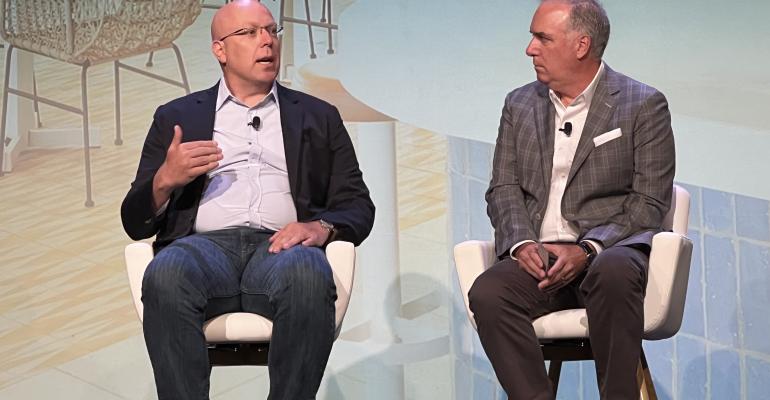While so many of the conversations around restaurant technology are high-level and focus on cutting-edge innovations like voice AI, automation, ChatGPT and more, in reality, restaurant operators are thinking about “what works” and “what’s needed” instead of what’s cool. At the annual FSTEC conference produced by Winsight this month in Dallas, a major theme of discussion was how to balance the need for up-to-date technology with smart investments that don’t deter hospitality. In other words, when it comes to building a tech stack or figuring out whether to invest in robots, the message is clear: proceed with caution.
“We’re always purposefully cautious with technology because it can mutate your brand DNA, and sometimes you get a mutation that lets you shoot lasers out of your eyes, but many mutations are cancer,” Sean Thompson, vice president of information technology for Freddy’s Frozen Custard and Steakburgers said during an FSTEC session on “Driving Customer Experience, Profitability & Growth through Technology-Led Ops Excellence.” “We’re very protective of what we do. So, yes, we’ve leaned on tech to help out with hiring, staffing, and even back of house production, but we always know what our core values are and make sure the technology is enhancing that. We’re not chasing the shiny object.”
In the same session, MJ Worsham, director of restaurant technology for Five Guys said that he feels any new tech innovation has the “burden of proof” to show that these tools work and are useful for operators, which is how Five Guys is approaching technology like machine learning-backed forecasting for back of house operations, which they have not invested in yet, but are asking questions to perhaps head in that direction one day.
“It's just really homing in on questions like, ‘when are your digital sales up? When are your stores hammered?’—the things that are harder to figure out, and what tech can do to answer those questions,” Worsham said. “All of these things add to the complexity [of forecasting]. But the tools are out there, and you just have to make sure that your team believes they are the best for business and the best to stack properly.”
One of the buzziest tech topics right now both at the FSTEC conference and the industry at large is AI: how much do you invest in AI, how do you factor in cost, and even questions like, “what is the difference between ‘regular’ AI and generative AI like ChatGPT?” As AI in the hospitality industry is still in its infancy stages, operator opinions were all over the place, but most speakers and attendees at FSTEC agreed that it will play some role in the future of the restaurant industry, though it is not clear exactly what. Some operators seemed to want to pump the brakes on AI innovation in restaurants.
“I think AI is the devil of this industry,” Gregg Majewski, founder of Craveworthy Brands said during FSTEC main stage session “C-Suite in the Hot Seat.” “I think having AI serve your customers isn’t having any effect on feedback or outreach. Even with team training…if you take away their ability to learn on the job training and give it to artificial intelligence, we’re affecting a whole new generation of industry leaders….You will never see AI in my front of house, we will always be hospitable to guests.”
While this might be more of an extreme take on the future of AI, other operators did express concern with balancing investment in AI/automation to offset labor issues with making sure hospitality is still front-and-center. Denver-based chicken chain, Birdcall, for example, is trying to utilize AI to redeploy labor instead of replace labor.
“AI is certainly going to be part of the solution,” Mark Lohmann, CEO of Birdcall, said during the same FSTEC session. “We’ve always looked to technology as a way to reduce labor…but at the same time, there’s always been this tension between technology and delivering a personal experience to guests…We are actually redeploying our employees to the front of to make sure our restaurant leaders get out in the community, touch the tables, and talk to every guest. We believe that no matter what happens over the coming years from a tech standpoint, hospitality has to be foundational.”
Contact Joanna at [email protected]




